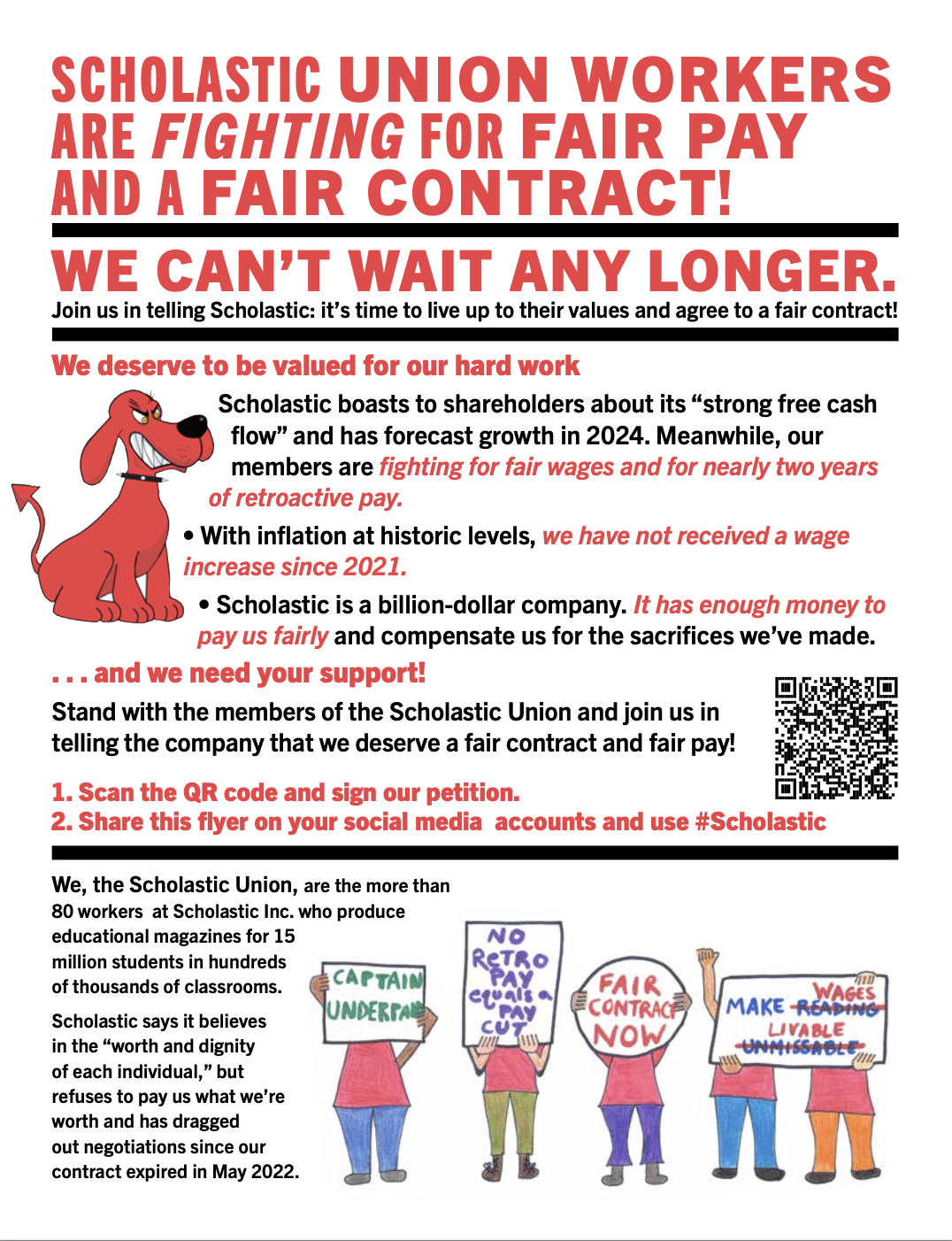Scholastic Workers in NYC Can’t Wait Any Longer For a Contract!
Members of the Scholastic Union recently distributed this flyer inside the company’s offices at 557 Broadway in Manhattan.
By Joe Maniscalco
Was there ever a sweeter day in grade school than when somebody from the principal’s office walked into class holding a cardboard box and announced the Scholastic books everybody ordered were finally here?
The roughly 80 Scholastic Union workers who’ve now spent a solid year trying to bargain for a living wage sure wish the “world’s largest publisher and distributor of children’s books” would get off the pot and extend some of that sweetness to them — right away!
Scholastic employees have been working without a contract since May 2022 and while the production editors and writers Work-Bites spoke to have managed to keep the Scholastic magic alive — never missing an issue during Covid — they are barely holding on themselves.
Alison Colby is an industry veteran who worked at both the Village Voice and the New York Times before coming to Scholastic a few years ago. At 59, she was happy to land the job with the prestigious company.
"Ageism is real,” she says. “I was thrilled to be hired.”
Problem was the ridiculous salary Scholastic was willing to pay. According to Colby, the company was paying her what she was earning at the Voice 20 years prior.
Initially, the focus was on basic survival. “But now,” Colby says, “I’m furious.”
Colby and her co-workers, who are represented by The NewsGuild of New York, have been using their vast reservoir of creativity and intelligence in an attempt to knock the Scholastic bosses out of their slow walk stupor.
Last week, they papered Scholastic’s offices at 557 Broadway in New York City with flyers making it clear workers “Can’t Wait Any Longer” for the bosses to agree to terms that reflect the economic realities of living in the most expensive city in the United States.
Flyers went up in the cafeteria, in the stairwells — one even made it directly into the hands of CEO Peter Warwick — although they all quickly disappeared the following morning.
The Scholastic Union has also held rallies outside the building and insisted on remote negotiating sessions — over the management’s objections — so that everybody in the bargaining unit is privy to the proceedings.
Workers say the tactics have been effective — with the remaining demand being Scholastic bump up the minimum salary to $65,000 a year with a general wage increase that keeps up with inflation.
Seems like a very modest ask, indeed, given a Fund for the City of New York report issued earlier this year, found workers actually need to earn a six-figure salary just to make it in this town.
“Scholastic says it believes in the “worth and dignity of each individual, but refuses to pay us what we’re worth and has dragged out negotiations since our contract expired in May 2022,” the union flyers read in part.
Scholastic does appear to lean heavily on its lofty editorial “credo,” but in practice its behavior is indistinguishable from any other profit-driven U.S. corporation that loves stalling and dragging out the bargaining process — sometimes, for years.
Most often, this is a calculated effort to exhaust workers and make them desperate enough to accept any deal the bosses want to impose on them. Other times, however, the aim is nothing less than busting the union through decertification.
Anna Starecheski, a senior editor at Scholastic has been in on all of the negations thus far between the company and the union.
“They’re very combative,” she tells Work-Bites, “saying things like, ‘that’s not gonna fly’ and nitpicking about the actual cost of living.”
Work-Bites reached out to Scholastic for comment on this story but has yet to receive a response.
“I think we’re gonna have to escalate our actions,” Starecheski says.
It’s not as if the company is clueless about the fundamental economics and the needs of workers. This past spring, Scholastic issued a white paper with the Yale Child Study Center highlighting declining reading scores disproportionately impacting “students who are more likely to be from low-income communities and communities of color.”
Yep. You don’t need a white paper to understand child development suffers when parents can’t afford to pay the rent — or buy a Scholastic book.

